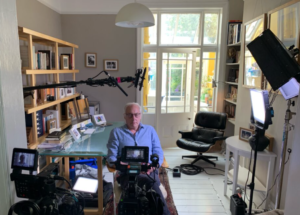- X marks the spot again - 17th February 2026
- Wordy again part three - 16th February 2026
- ‘Lies, damned lies etc…’ - 13th February 2026

During 23 years with the BBC, our Editor, Welshman Phil Parry has always found one of the best environments for filming was inside prisons, and this is now put centre stage by the huge controversy today about jails being overflowing, so inmates are being released early.
We have been told that prisons are a “disaster” and a “timebomb”, but I have never found them so.

For filming in they were excellent.
It was a closed environment (so you weren’t bothered by the weather), the shots you gained were superb, the stories were unbelievable, and the inmates were invariably happy to talk about why they had been imprisoned, because their family and friends knew anyway.
I have filmed in any number of jails over the years; for the now-defunct BBC Cymru Wales (BBC CW) Current Affairs programme Week In, Week Out (WIWO), for BBC Two’s Public Eye, and Newsnight, as well as with Panorama.

I always liked it.
Now though they are the centre of attention for another less positive reason – they are too full.
The prison population on July 12 was 87,505, close to the record high of 88,000 in 2011, and the “usable operational capacity” (the total number of people a prison can hold while taking into account issues like control and security) was 88,956.

There are now only 700 free places, with a particular squeeze in adult-male prisons.
Get below 300 and prisons would have to stop taking new arrivals to meet health-and-safety protocols, says Tom Wheatley of the Prison Governors’ Association (PGA).


This picture is why prison governors wrote to party leaders during the General election (GE) campaign, to warn: “Within a matter of days prisons across the UK will be full” and that this would put the public at risk.
In March the remand prison population stood at 16,458, while in 2016, it was only about 10,000.
More people than before are also being returned to prison for breaching their release conditions.

In March, the number was around 12,000 – a record high – and roughly double the figure for 2016.
In 2023, the average prison sentence given in the Crown Courts in Wales and England (which are themselves under huge pressure), was more than 25 per cent longer than in 2012. But for some crimes, the increase has been even greater.

Sentences for robbery involving the threat or use of violence, for example, were 13 months longer on average in 2023 than in 2012, a rise of 36 per cent. Longer sentences mean more people in prison at any given time.
Unfortunately the UK comes near the top of the league among developed countries for banging up people (apart from in the USA where they are obsessed with it!).

In 2018 – the latest year for which comparable data is available – Wales and England had 150 prisoners per 100,000 people, the highest proportion in Western Europe.
Spain (138 per 100,000) and Portugal (126 per 100,000) were the two western European countries with the next highest rates of imprisonment.
Therefore some prisoners who have been convicted of less important crimes, are having to be released early.

The Justice Secretary Shabana Mahmood has told MPs that Rishi Sunak had left “a timebomb ticking away” when he called an election, and “…It is now clear that by September of this year our prisons will overflow. There is only one way to avert disaster”.
Those being let out before the end of their sentence later this Summer, will include some who have served 40 per cent of their term.

As Michael Howard might have said ‘prison worked’ for me – but hasn’t worked generally (the recidivism rate is extraordinarily high), and hasn’t worked generally because they are overcrowded.
Shots would not be as good now because people are stuffed in and angry…
Some of the stories in jails Phil has covered over the years, as he was gripped by the rare neurological condition Hereditary Spastic Paraplegia (HSP), have been released in a major book ‘A GOOD STORY’. Order it now!

Regrettably publication of another book, however, was refused, because it was to have included names.
Tomorrow – he looks at more evidence of how the use of ‘business-speak’ is growing ever stronger – with it even leading the field in the media world.









